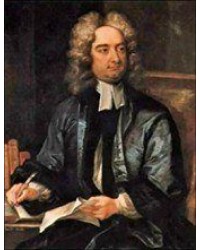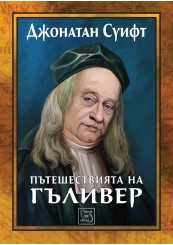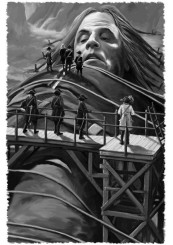Jonathan Swift

Jonathan Swift (1667–1745) was an Anglo-Irish satirist, essayist, political pamphleteer (first for the Whigs, then for the Tories), poet and cleric who became Dean of St Patrick's Cathedral, Dublin.
Swift is remembered for works such as A Tale of a Tub (1704), An Argument Against Abolishing Christianity (1712), Gulliver's Travels(1726), and A Modest Proposal (1729). He is regarded by the Encyclopædia Britannica as the foremost prose satirist in the English language, and is less well known for his poetry. He originally published all of his works under pseudonyms – such as Lemuel Gulliver, Isaac Bickerstaff, the Drapier – or anonymously. He was a master of two styles of satire, the Horatian and Juvenalian styles.
His deadpan, ironic writing style, particularly in A Modest Proposal, has led to such satire being subsequently termed "Swiftian".
Jonathan Swift was born into a poor family. In 1682, Swift entered Trinity College where he received a B.A. by "special grace," a designation for students who did not perform very well while there. Upon leaving Trinity College, Swift went to England to work as a secretary (a patronage position) for Sir William Temple. In 1692, Swift received an M.A. from Oxford; in 1702, he received a D.D. (Doctor of Divinity) from Dublin University. In 1694, he was ordained as a priest in the Church of Ireland (Anglican Church) and assigned as Vicar (parish priest) of Kilroot, a church near Belfast (in northern Ireland). In 1696, he returned to working with Sir William Temple, and in 1699, after the death of Sir William, he became chaplain to Lord Berkley.
In 1700, Swift became the Vicar of Laracor, Ireland, and he was also appointed prebend (an honorary clergyman serving in a cathedral) at St. Patrick's Cathedral in Dublin. In 1707, Swift was appointed as an emissary to the Church of Ireland, and in 1713, he was appointed as Dean of St. Patrick's Cathedral in Dublin. Throughout all this time, and, indeed, after his appointment as Dean of St. Patrick's, Swift continued writing satirically in various genres, including both prose and poetry, using various forms to address different causes, including personal, behavioral, philosophical, political, religious, civic, and others.





